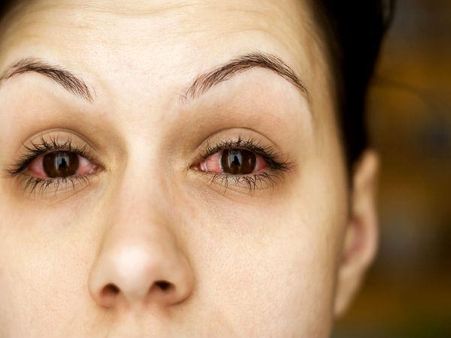Just In
- 42 min ago

- 1 hr ago

- 2 hrs ago

- 3 hrs ago

Don't Miss
- Movies
 Did Kareena Kapoor And John Abraham Put An End To Years Of Rivalry? All You Need To Know About Their Cold War
Did Kareena Kapoor And John Abraham Put An End To Years Of Rivalry? All You Need To Know About Their Cold War - Education
 Gujarat Board Class 10, 12 Results To Be Declared Soon, Check out for more Details
Gujarat Board Class 10, 12 Results To Be Declared Soon, Check out for more Details - Finance
 Indian Rupee Hits Record Low Amid Middle East Concerns And Fed Rate Speculations
Indian Rupee Hits Record Low Amid Middle East Concerns And Fed Rate Speculations - Sports
 RCB IPL 2024: Three Players Royal Challengers Bengaluru Must Drop for the Season
RCB IPL 2024: Three Players Royal Challengers Bengaluru Must Drop for the Season - News
 SC Rebukes Yoga Guru Baba Ramdev For 'Irresponsible Attitude' In Patanjali Case
SC Rebukes Yoga Guru Baba Ramdev For 'Irresponsible Attitude' In Patanjali Case - Technology
 Motorola Edge 50 Series Launching Globally Today - Check Price, Specs
Motorola Edge 50 Series Launching Globally Today - Check Price, Specs - Automobiles
 Who's At Fault? The Complex Liability Of Autonomous Vehicles
Who's At Fault? The Complex Liability Of Autonomous Vehicles - Travel
Maximise Your First Indian Adventure With These Travel Tips
We Bet You Didn’t Know This About Diabetic Retinopathy
Diabetic retinopathy causes, risk factors, and symptoms.

Diabetic retinopathy, a.k.a diabetic eye disease, does not occur overnight.
But over time, an excessively high level of blood sugar does end up damaging the retina of your eyes and its blood vessels, which in turn, turns you blind.
So if you are a diabetic, you really need to read this.

Risk Factors of Diabetic Retinopathy
Diabetic eye disease is one of the most common complications of diabetes. And neither Type 1 patients nor Type 2 patients are spared from this creeping sickness.
Nevertheless, the following are some of the risk factors of developing this eye condition:-
1. Time Since Diagnosis
The risk of developing diabetic retinopathy is considerably higher in patients who have lived with diabetes for a long time, as compared to those who have just been diagnosed.
2. Status of Blood Sugar
People who have poorly-controlled blood sugar are at a greater risk of developing the complications associated with diabetes, including diabetic eye disease.
3. High Blood Pressure
Your blood vessels are not equipped to handle blood rushing through them under high pressure for long durations of time. That's why those who suffer from hypertension often develop arterial complications, including diabetic retinopathy.
4. High Cholesterol
Cholesterol plaques don't just clog the arteries supplying your heart. They can even clog the arteries in the peripheries of your body, including the eyes.
5. Pregnancy
Pregnancy is the most vulnerable period of a woman's life. And many often develop gestational diabetes (diabetes caused by pregnancy).
6. Tobacco Use
Tobacco use is known to cause endarteritis. That is, it can cause constriction of capillaries and cut off the blood supply in various parts of the body.


Diabetic Retinopathy Symptoms
Diabetic retinopathy develops over time.
Nevertheless, it shows no symptoms in its early stages. And only causes the following once the disease has progressed considerably.
1. Blurred vision
2. Fluctuating field of vision
3. Floaters - dark strings/spots that float past your field of vision due to hemorrhaged blood in the vitreous humor of the eye.
4. Color blindness
5. Blindness


Diabetic Retinopathy Types
Diabetic retinopathy is classified into two types based on its stage of progression.
Type 1: Non-Proliferative Type
Diabetic retinopathy develops when the blood vessels supplying your retina (and eyes) become obstructed. This causes minute bulges or aneurysms to form all over the occluded vessels as they fail to push out the blood.
Type 2: Proliferative Type
Once the disease has progressed considerably and a large number of arteries are occluded, new vessels start to develop from these obstructed ones.
Only, they are abnormal blood vessels and fail to supply the eye properly, and instead leak blood and fluid into the clear jelly of the eyeball (the vitreous humor), which gradually leads to floaters and then vision loss.
What Should You Do?
If you are a diabetic, you are already at a high risk of developing diabetic retinopathy.
In fact, when we talked to Dr. Bhujang Shetty about blindness, he revealed that all diabetic patients need to get their eyes checked by an ophthalmic surgeon once every year because a lot of people develop blindness even after controlling their blood sugar religiously.
So if you are diabetic, we strongly recommend that you visit the nearest eye hospital once every year for a checkup. Because when it comes to diabetic retinopathy, only ophthalmologists have the know-how to keep you from going blind.

Was This Article Helpful?
Yes?
Then please share it so others can read it too.

-
 healthExclusive: World Oral Health Day 2024: Doctor Shares How Diabetic Patients Can Maintain Their Oral Health
healthExclusive: World Oral Health Day 2024: Doctor Shares How Diabetic Patients Can Maintain Their Oral Health -
 healthWhat Is VIP? It Is Not What You Think! This One Is Connected To Blood Glucose, Here's What You Need To Know
healthWhat Is VIP? It Is Not What You Think! This One Is Connected To Blood Glucose, Here's What You Need To Know -
 pregnancy parentingWhat Are The 4 Must Have Vitamins For Kids With Diabetes?
pregnancy parentingWhat Are The 4 Must Have Vitamins For Kids With Diabetes? -
 healthDoes This Everyday Cooking Ingredient Trigger Diabetes?
healthDoes This Everyday Cooking Ingredient Trigger Diabetes? -
 healthRoller Coaster Effect In Diabetes: Why Does My Blood Sugar Level Go Up And Down, How To Stop It
healthRoller Coaster Effect In Diabetes: Why Does My Blood Sugar Level Go Up And Down, How To Stop It -
 healthSinger Shakira Loves These 2 Indian Sweets! How To Make It Diet-Friendly?
healthSinger Shakira Loves These 2 Indian Sweets! How To Make It Diet-Friendly? -
 healthWorld Diabetes Day 2023: 3 Weird Things That Can Put You At Risk Of Developing Diabetes
healthWorld Diabetes Day 2023: 3 Weird Things That Can Put You At Risk Of Developing Diabetes -
 healthWorld Diabetes Day 2023: Daily Habits That Make One At Risk Of Diabetes
healthWorld Diabetes Day 2023: Daily Habits That Make One At Risk Of Diabetes -
 wellnessWorld Diabetes Day 2023: Avoid These Common Mistakes When Testing Blood Sugar Levels
wellnessWorld Diabetes Day 2023: Avoid These Common Mistakes When Testing Blood Sugar Levels -
 healthDiwali 2023: Kalakand Recipe For Diabetic People; It Is Sugar-Free & Keto-Friendly
healthDiwali 2023: Kalakand Recipe For Diabetic People; It Is Sugar-Free & Keto-Friendly -
 healthHow Poor Air Quality During Can Raise Your Diabetes Risk
healthHow Poor Air Quality During Can Raise Your Diabetes Risk -
 healthWhip Up These 3 Diwali Sweets For Your Diabetic Mom Over 40
healthWhip Up These 3 Diwali Sweets For Your Diabetic Mom Over 40


 Click it and Unblock the Notifications
Click it and Unblock the Notifications



